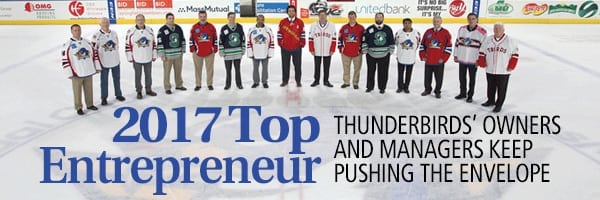
Top Entrepreneur 2017
T-Birds’ Owners and Managers Continue to Push the Envelope
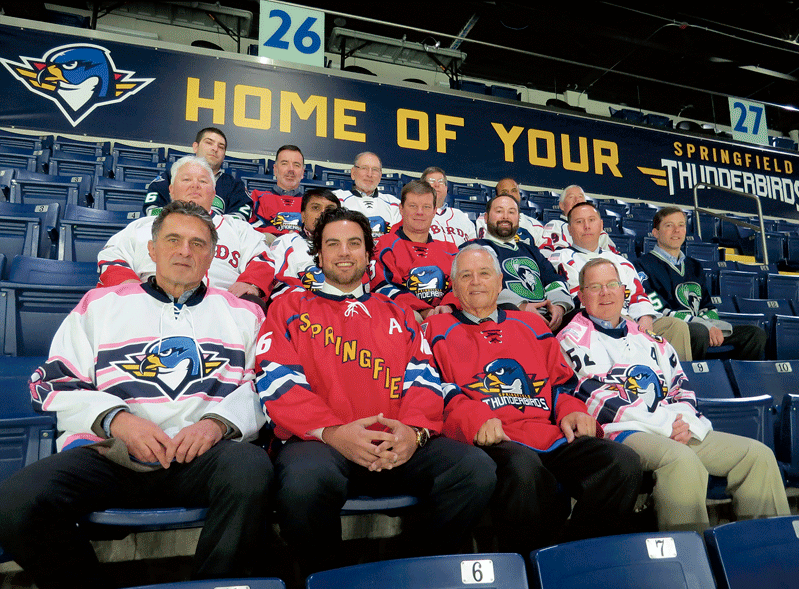
Front row, from left, Dante Fontana, Nathan Costa, Frank Colaccino, and Brian Fitzgerald; second row, from left, Paul Picknelly, Dinesh Patel, Chris Bignell, Chris Thompson, Sean Murphy, Francis Cataldo; third row, from left, Derek Salema, Peter Martins, Jerry Gagliarducci, John Joe Williams, Vidhyadhar Mitta, and James Garvey.
An Exercise in Teamwork
Back in the spring of 2016, a consortium of owners came together, bought the Portland Pirates AHL franchise, and relocated it to Springfield. It was said that this group brought hockey back to the City of Homes 10 days after it left. In reality, though, it has brought much more, including excitement, energy, innovation, and vibrancy — along with hockey. For doing all that, the team of owners and managers has been named BusinessWest’s Top Entrepreneurs for 2017.
If you go on eBay this morning, you can buy a bobblehead featuring Red Sox slugger David Ortiz wearing sunglasses and a Springfield Thunderbirds jersey. List price: $59.99.
But while you can buy it now, you can’t get it for at least a month or so.
That’s because no one actually has one to send to you. These items won’t be distributed until the Feb. 17 Thunderbirds game against the Providence Bruins.
The fact that this bobblehead is already for sale online demonstrates many things — from the incredible popularity of Big Papi to the awesome power of capitalism at work (60 balloons for a bobblehead?).
But it demonstrates something else as well: Just how far hockey has come in Springfield in 20 short months. Indeed, in the late spring of 2016, there was no hockey in Springfield. Well, there was no American Hockey League franchise, anyway.
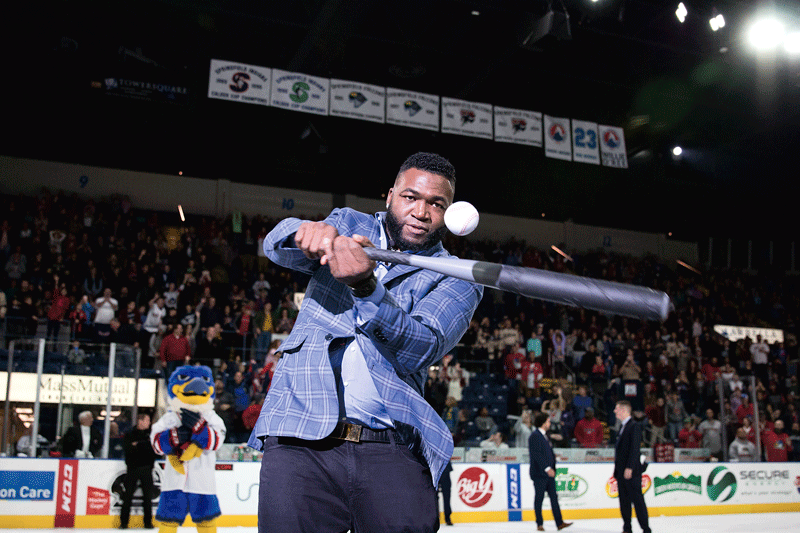
Red Sox legend David Ortiz belts a foam baseball into the crowd during the game on Nov. 11. His appearance in Springfield represents just one example of the outside-the-box thinking that defines the new ownership and management team.
The Falcons, who had been playing at the MassMutual Center for more than 20 years, had pulled up stakes and were heading to Arizona. Into this void stepped what would become, by AHL standards (or any standards, for that matter), a huge ownership group of 28 that brought professional hockey back to Springfield.
Only, all 28 of them would be put off by that last phrase to some extent.
Indeed, they would prefer to say that hockey is just one of the things they’ve brought to the City of Homes. They’ve also brought imagination and entrepreneurship; Star Wars Night and $3 Coors Light draughts on Friday night; free parking in the Civic Center Garage (actually, it’s back by very popular demand) and … David Ortiz bobbleheads.
Evidence of all this was in abundance on Jan. 6, a frigid Saturday night when the wind chill was well below zero, representing a microcosm of what the team has accomplished and what it has become.
This was Blast from the Past Night, with the team donning Springfield Indians jerseys from the early ’90s for a tilt against the Providence Bruins. The night became a mix of nostalgia, high energy, and record sales at the merchandise shop.
“It was 6 below zero, and we had more than 6,000 people in this arena,” said Paul Picknelly, president of Monarch Enterprises and managing partner among the owners. “We sold out the place with families that are coming to downtown Springfield, feeling comfortable bringing their families downtown for professional sports.
“It’s not just about hockey,” he went on. “The previous owners’ mindset was ‘we have hockey in Springfield.’ What we’re saying is that we have something different that we’re offering the community.”
For bringing this family entertainment, this ‘something different,’ as well as much-needed vibrancy and even validity to downtown Springfield, the Thunderbirds team — not the one on the ice (although it is also a big part of the story), but rather the ownership and management team — has been selected by the leaders at BusinessWest as the recipients of the magazine’s Top Entrepreneur Award for 2017.
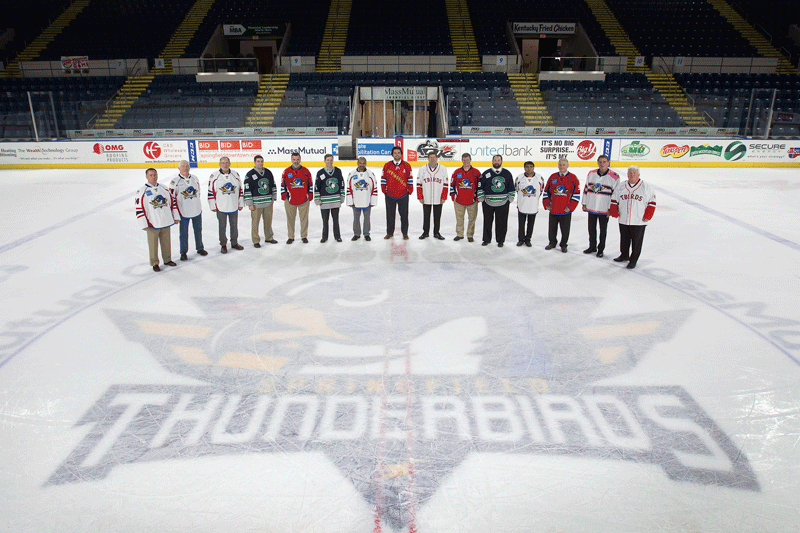
Several of the team’s owners and managers gather on the ice in a host of jerseys worn by the team over the past season and a half. The ownership group is large (28 individuals and groups) but very engaged.
This group was chosen among a host of other intriguing candidates for many reasons, but especially the manner in which it has changed the landscape since that headline announcing that the Falcons were flying southwest — and we don’t mean the airline.
There is considerably more energy downtown on 36 game days and nights (there are actually a few morning contests as well, as we’ll see) between October and April, and maybe beyond.
But that’s just part of the story. Indeed, the T-Birds are a year-long phenomenon and a region-wide resource as well, thanks to an omni-present mascot and a management team laser-focused on keeping the team top of mind, even in the middle of summer.
The phrase ‘weaving our way into the fabric of the community’ was uttered by more than a few of the owners we spoke with recently, and this is exactly what the team has done.
For their ability to do that, and especially for their efforts to bring not only hockey but much more back to Springfield, the ownership and management team is truly worthy of BusinessWest’s Top Entrepreneur honor.
Owning the Solution
They sound like characters on one of those Saturday morning cartoon shows.
But ‘Boomer’ and ‘Squeaky’ are real — well, sort of. They are the mascots, respectively, for the Thunderbirds and Balise Motors’ growing stable of car washes in Western Mass.
They appear together sometimes, and increasingly, and these joint appearances are just one example of the many ways in which the 28 owners of the Thunderbirds — Jeb Balise, a principal with the family-owned Balise corporation, is one of them — are involved and invested in the team and its success in Springfield and across the region.
Other examples abound, from construction company owner Dave Fontaine putting banners for the team at his construction sites, to Dunkin’ Donuts franchise owners Peter Martins and Derek Salema running promotions at their stores (more on one of those later); from employees at Red Rose Pizza wearing T-Birds jerseys on game nights (principal Anthony Caputo is one of the owners) to Picknelly, a local partner with MGM Springfield, convincing that corporation to not only be a sponsor of the T-Birds, but to actively help market it after the casino opens this fall.
It happened very quickly, and the reason it did, and the reason everyone got involved from the ownership standpoint, is because everyone loves Springfield. We have diverse backgrounds, but we all love Springfield, and it’s an easy ask when you ask someone to invest in it.”
Indeed, just before a slot machine pays out to a winner, a screen will pop up asking the lucky player if he or she would like to buy a ticket to a Thunderbirds game, said Picknelly, adding that this is one of many ways the casino will help promote the team.
Collectively, these initiatives, and this involvement, speak to how unified these owners are in their desire to secure a long, prosperous future for this franchise. They have different businesses and different backgrounds — and many of them didn’t know much about hockey when they were approached about this venture — but they understood the importance of the team to the city, especially at that critical time in its history.
Indeed, using different words and phrases, the owners we spoke with said that the spring of 2016, when they all came together in this enterprise, was not the time (if there really ever is a good time) for Springfield to be without a hockey team.
Elaborating, they said that, with MGM coming in the fall of 2018, Union Station set to open soon, greater vibrancy downtown, and a general sense of optimism, the city needed to maintain momentum, not lose any.
So when Picknelly called and asked them to be part of a growing consortium of owners, they found it easy to say ‘yes.’
“I remember getting the call from Paul on a Friday afternoon; he said, ‘did you see the paper today?’” said Fran Cataldo, a principal with C&W Realty, referring to the day the Falcons’ owners announced they were selling the team to the NHL’s Phoenix Coyotes. “I said, ‘yeah, I did.’ And he said, ‘it’s not going to happen; we’re going to keep hockey here.’
“And in the course of 72 hours, we identified a team, negotiated a purchase-and-sale agreement, and made a deposit on the team,” he went on. “It happened very quickly, and the reason it did, and the reason everyone got involved from the ownership standpoint, is because everyone loves Springfield. We have diverse backgrounds, but we all love Springfield, and it’s an easy ask when you ask someone to invest in it.”
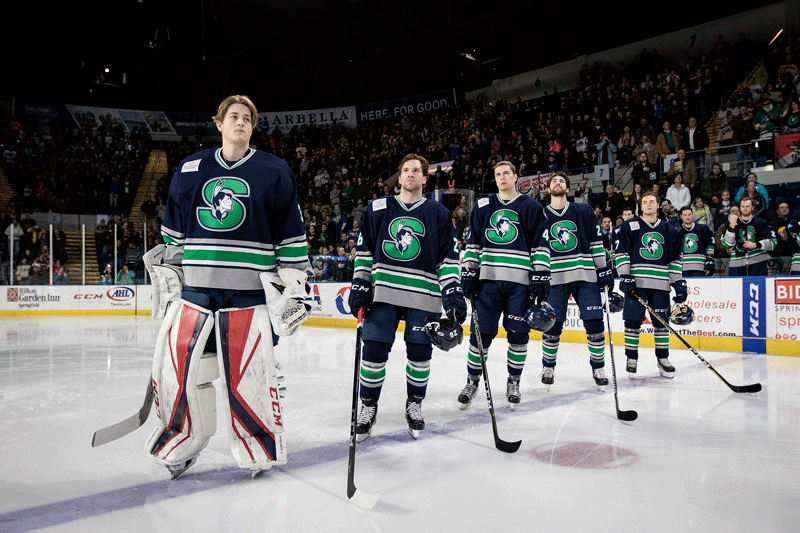
Thunderbirds players wore replica Indians jerseys on Blast from the Past Night on Jan. 6, an event that became a microcosm of the team’s efforts to create energy and an experience at the MassMutual Center.
Cataldo, a long-time friend of Picknelly’s, said he’s worked with him on a number of initiatives that fall into the broad categories of economic development and improving the public perception of Springfield. And the purchase of the Thunderbirds fell into both categories, so be called it a “natural,” especially in the context of the question everyone was asking 21 months ago: ‘what if we lost hockey?’
“It’s more than losing hockey,” he said, answering the question himself. “You’re losing 4,000 or 5,000 people 30-plus nights a year downtown. They’re bringing their families downtown, they’re parking, they’re eating, they’re going out afterward; it’s a huge, huge economic engine for Springfield.
Frank Colaccino, CEO of the Colvest Group, who admits that he didn’t know a red line from a blue line when Picknelly called him, tells a similar story.
“He called me and said, ‘we’ve got to move quick; we need the support of people who work in Springfield and care about Springfield,’” he recalled. “I think it took me all of about five minutes to say, ‘Paul, do you think we’ll get our money back?’ He said, ‘yeah, I think we will,’ and I was in.”
Collectively, the ownership team being assembled needed to raise $5.5 million for the down payment on the team, and as it went about doing so, it focused on keeping the group local and committed to the region.
It even turned down more than $1 million from a New York investor that wanted in, but also wanted some controls in exchange for its investment.
“We all sat around this table and said, ‘we don’t want that,’” said Colaccino. “The person’s not from the area, doesn’t care about the area, and we decided we didn’t want to give up some of those controls. And it took some guts to walk away from that and say, ‘we’re going to raise this money.’”
In the span of about 10 days, Springfield lost hockey and got it back, but the act of buying the Portland (Maine) Pirates and bringing them to Springfield would be only the first expression of entrepreneurship with this franchise.
Net Results
The second, whether the ownership team realized it at the time or not (and they probably did), was hiring Springfield native Nate Costa to lead this venture.
Costa had most recently been working in the American Hockey League office in its Business Services Department, but he also had extensive experience in the field, if you will, working for the league’s San Antonio Rampage.
He arrived in Springfield with what he called a “blueprint” — one that called for not just hockey, but affordable family entertainment — but also with his hands full.
Indeed, the team didn’t have a name at that point, or colors, a uniform design, or even a lease with the MassMutual Center. All that got done, and Costa set about putting to work the lessons he learned in San Antonio, but also from watching some of the league’s most successful franchises.
From the outset, he said the focus has been on providing an experience, not just three periods of hockey, and also on making the team visible and active within the community. Doing those things requires a real commitment from ownership and the requisite resources to get the job done properly, something the previous ownership didn’t provide.
Chris Thompson, the Thunderbirds’ senior vice president of Sales & Strategy, who has worked with the team for nearly a decade and for three different ownership groups, described the difference between then and now.
“It’s a breath of fresh air having the support of the local investment group to give us the resources to be able to go out there and tell the story,” he explained. “We did some cool things with the Falcons back in the day, but we could never tell the story; the biggest difference between then and now is that the local group is fully engaged.”
It is also more entrepreneurial, a word that could be used to describe both ownership and management, said Costa, adding that this has become the team’s mindset largely out of necessity.
Elaborating, he said that, from his vantage point in the AHL offices, he saw what he called missed opportunities in Springfield, especially with regard to ticket sales at all levels, especially group sales and season tickets.
His goal upon taking over the team was to seize those opportunities.
“I put together a plan that I almost had in the back of my mind,” he recalled. “It was really focused on grassroots efforts — beefing up our season-ticket sales, doing more with marketing and on social media, and really taking an entirely fresh look at the franchise.
“I had absolute confidence, if we stuck to our plan when it came to ticket sales and having a sales mindset, that this could work here,” he went on. “And I think we’re starting to see that. It’s taken some time, but year one was a huge success on a number of levels.”
This was made clear by the team’s haul when it comes to year-end awards handed out by the league. The credenza in the conference room is crowded with such plaques, which recognize achievement in areas ranging from group ticket sales to “recovered revenue.”
Costa said those plaques result from a systematic look at all aspects of the operation with an eye toward making changes when they were needed, and that was often the case.
As it was with ticket prices, for example, said Costa, noting that, with the previous administration, all seats were priced the same. The new ownership has introduced price flexibility, dividing the seating bowl into several areas, with different prices for each one.
Another focal point was concessions. Using the team’s relationship with MGM, management was able to negotiate a Friday-night special on concession and beer sales in an effort to get more younger people and families in the arena.
Still another matter was parking, which was a recognized deterrent for many potential fans. So the club negotiated a deal whereby the team would make a payment to the city, enabling patrons to park in the Civic Center Garage for free, a step that brought immediate and lasting results.
“We really tried to take all the things we had heard from the previous couple of years and take them head on and find ways that we could make a tangible impact,” said Costa. “We did this not only for the casual fan, but the season ticket holders; they’re going to reap the biggest benefit from this because they’re coming every night.”
Goal Oriented
As for that aforementioned promotion at Dunkin’ Donuts, one that involved giving away two game tickets with purchases at the drive-up window on a specific day, the mere mention of it brought some wry smiles and looks toward the ceiling among those talking with BusinessWest.
This wasn’t a promotion gone wrong, per se, but one that didn’t go exactly as planned. And this created one of those good problems to have — sort of, but not really.
To make a long story a little shorter, far more people redeemed the tickets for this early-season game than management anticipated, leaving far fewer seats available for walk-up customers, a scenario the team has worked very hard to avoid.
Previous Top Entrepreneurs
• 2016: Paul Kozub, founder and president of V-One Vodka
• 2015: The D’Amour Family, founders of Big Y
• 2014: Delcie Bean, president of Paragus Strategic IT
• 2013: Tim Van Epps, president and CEO of Sandri LLC
• 2012: Rick Crews and Jim Brennan, franchisees of Doctors Express
• 2011: Heriberto Flores, director of the New England Farm Workers’ Council and Partners for Community
• 2010: Bob Bolduc, founder and CEO of Pride
• 2009: Holyoke Gas & Electric
• 2008: Arlene Kelly and Kim Sanborn, founders of Human Resource Solutions and Convergent Solutions Inc.
• 2007: John Maybury, president of Maybury Material Handling
• 2006: Rocco, Jim, and Jayson Falcone, principals of Rocky’s Hardware Stores and Falcone Retail Properties
• 2005: James (Jeb) Balise, president of Balise Motor Sales
• 2004: Craig Melin, then-president and CEO of Cooley Dickinson Hospital
• 2003: Tony Dolphin, president of Springboard Technologies
• 2002: Timm Tobin, then-president of Tobin Systems Inc.
• 2001: Dan Kelley, then-president of Equal Access Partners
• 2000: Jim Ross, Doug Brown, and Richard DiGeronimo, then-principals of Concourse Communications
• 1999: Andrew Scibelli, then-president of Springfield Technical Community College
• 1998: Eric Suher, president of E.S. Sports
• 1997: Peter Rosskothen and Larry Perreault, then-co-owners of the Log Cabin Banquet and Meeting House
• 1996: David Epstein, president and co-founder of JavaNet and the JavaNet Café
“It was the Friday after David Ortiz, so we were topical and people wanted to check us out,” Cataldo recalled. “The redemption, which is typically low for those tickets, was through the roof, and we essentially sold out of our tickets.”
Said Costa, “at the end of the day, we were turning people away at the box office, which you don’t want to do all the time.”
If the Dunkin’ Donuts promotion was something that went wrong — and that’s not the term most would prefer to use in reference to that night — then not much else has for this team.
Indeed, just about everything has gone exceedingly right.
Including the so-called ‘Shoot to Win’ promotion involving one of the team’s newest sponsors, Mercedes-Benz of Springfield.
In case you missed it — and that was almost impossible to do — young Nathan Vila managed to shoot a puck into a hole not much wider than the puck itself from about 150 feet away to win a new Mercedes GLA SUV. But that’s only part of the story.
“It was just before Christmas, and the young man [Nathan] was heading into the service in a few weeks and gave the car to his mother to drive,” said Peter Wirth, a principal with the dealership. “You really couldn’t script it any better.”
There hasn’t been a script, per se, for anything the Thunderbirds and their management team have done since they started scrambling to get the team ready for the start of the 2016-17 season in that hectic summer other than do what entrepreneurs do famously — think outside the box, innovate, invest in the company, and take some calculated risks.
And these are exactly the personality traits that inspired Wirth and his wife, Michelle, to want to be part of what was happening with the Thunderbirds.
“We went to a few games, and they seemed to be doing things the right way … it might as well have been the NHL; they were delivering a really good product,” he said. “They think outside the box, and they create energy and excitement, and we wanted to be part of that.”
And nothing personifies those qualities more than the night David Ortiz came to Springfield.
In case you missed it — and that, too, was almost impossible to do — the Red Sox slugger appeared before and during the Nov. 11 game against the Laval (Quebec) Rocket. He drove an ATV on the ice, signed a ton of autographs, and whacked some foam baseballs into the sellout crowd.
It was a huge success, but it was also a considerable risk given the huge sticker price attached to an appearance from Big Papi. But it was a risk the ownership team was more than willing to accept it.
“That was a huge commitment — those big stars certainly don’t come cheap,” said Colaccino. “But when that idea was presented, everyone around this table said, ‘what a great idea.’ The number being tossed around to get him here was a big one, but not one person said, ‘no, that’s not a good idea.’ Having a baseball guy come to a hockey arena … that’s outside-the-box thinking, and it was hugely successful.”
Costa quantified the matter by saying the team reaped a three-to-one return on that sizable investment thanks to a mix of corporate sponsorships, additional ticket revenue, a VIP event, merchandise, and special Red Sox-themed team jerseys made possible through the team’s relationship with MGM. Elaborating, he called the Ortiz night not only a microcosm of that blueprint mentioned earlier, but an example of his mindset when it comes to the team and its ownership.
“From day one, I’ve looked at this as a business venture because they’ve put their trust in me to make this work from a business perspective, and I’ve never lost sight of that,” he explained. “So when I presented the Ortiz piece, it wasn’t ‘give me what I need to get him,’ it was ‘here’s what it’s going to do for us, here’s what the return is going to be, here’s what it’s going to do for the community and the Thunderbirds name in general.’
“And coming from the American Hockey League and seeing what other AHL franchises need to do in a market like Springfield … it’s very entrepreneurial,” he went on. “It’s grassroots; it’s rolling up sleeves and doing the dirty work.”
Knowing the Score
Meanwhile, Costa said the Ortiz night was a very needed step to raise the bar in the team’s critical second year.
Indeed, calling on his extensive experience in the league, he said it’s not uncommon for a team to do well in its first year as it brings something new and different to a region. It’s also common for teams to struggle in their efforts to maintain that momentum.
“I knew it was going to be a challenge in year two to continue that momentum moving forward, and I knew we needed something special,” he said, referring to the Ortiz promotion but also a full year’s worth of events.
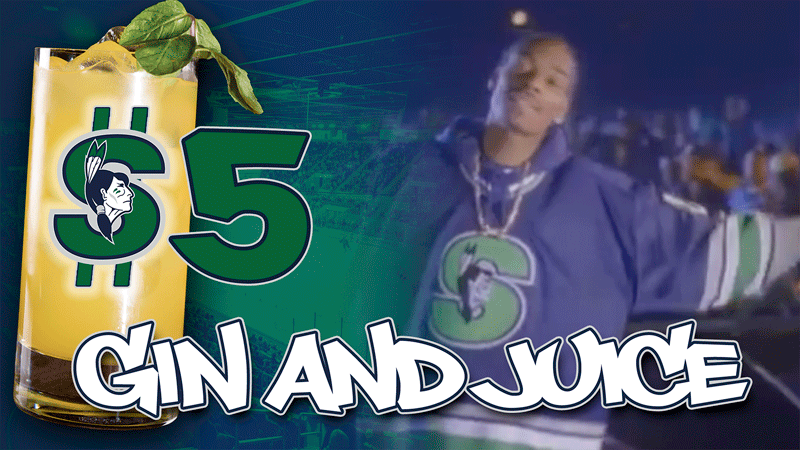
The Thunderbirds sold $10,000 worth of gin and juice at the Jan. 6 game, thanks to Snoop Dogg, his Indians jersey, and effective use of social media.
While Ortiz’s appearance in Springfield has probably been the high-water mark for this franchise, there have been plenty of other examples of outside-the-box thinking, risk taking, and, overall, an entrepreneurial mindset.
All those were on display on Blast from the Past Night, which highlighted the team’s success not only in creating an experience on the ice and in the arena, but in fully capitalizing on the awesome forces of social media.
In this case, the team put Snoop Dogg to work — or, more specifically, the Springfield Indians jersey he famously wore in the video for his song “Gin and Juice” — in its promotions for Blast from the Past Night. It was a natural tie-in to the evening’s festivities and inspiration for a $5 gin and juice special sold at the MassMutual Center that night.
“We sold $10,000 worth of gin and juice,” said Picknelly, noting that he and his son split one that night.
And then, there was Hockey Week in Springfield, staged in the middle of this month in an effort to bring people out during a difficult time of year and a few difficult days of the week.
The week started with a 1:05 p.m. tilt against the Hartford Wolf Pack on Martin Luther King Day. Youngsters were admitted to end zone seats for $5.55 courtesy of Friendly’s. The week continued with a Wednesday contest (those dates are always challenging) against one of the league’s most iconic franchises, the Hershey Bears. If the T-Birds won (and they did), then patrons’ ticket stubs would be good for the Feb. 7 game (yes, another Wednesday).
The week wrapped up with a Friday-night tilt against the Binghampton (New York) Devils, or a ‘3-2-1 Friday,’ as they’re called because a Coors Light, as noted, is $3, a hot dog is $2, and sodas are $1.
The unofficial goal moving forward, said Costa, with several owners nodding their head in agreement, is to make what happened on the night of that Dunkin’ Donuts promotion the norm.
Well, not exactly what happened that night, but the part about a game being sold out and patrons not to expect to be able to walk up to the ticket window a few moments before a game starts and buy some tickets.
“People are used to just walking up on game night and buying a ticket and getting a great seat,” Costa explained. “It’s not necessarily the case anymore, and from the beginning, that’s what we set out to do.
“What we’re trying to manufacture is urgency,” he went on. “That was the biggest thing we didn’t have coming into this. There was no urgency to buy tickets, no urgency to buy season tickets, no urgency to buy tickets early; we’ve tried to lay the foundation to change that — to create a sense of urgency.”
From all accounts, the team’s owners and managers are well on their way to doing just that.
Bottom Line
As he talked about the ownership group that he reports to, Costa acknowledged that 28 is a big number and one that most people would see as ungainly and something of a disadvantage.
He says this group is anything but that.
That’s because it’s not only large, but also visible on game nights and, most importantly, fully invested in the team, in every sense of that word.
“It’s been a huge benefit, and we couldn’t do what we do without it,” he said of the large group of owners. “We lean on them for support within the local community.”
Support comes in many forms — from getting much-needed introductions to exercising connections such as those needed to secure those Red Sox-themed jerseys for David Ortiz night, to bringing people to the MassMutual Center, as that Dunkin’ Donuts promotion did.
All that support has resulted in a changed landscape — where sometimes one can’t get a ticket on game night, and, yes, where David Ortiz bobbleheads are for sale on eBay two months before they’re actually handed out.
It’s a story of determination. A story of teamwork. But mostly, it’s a story of old-fashioned entrepreneurship.
George O’Brien can be reached at [email protected]




